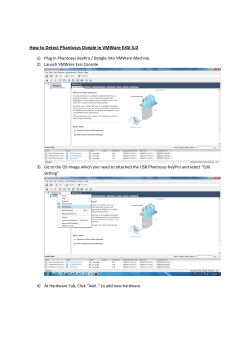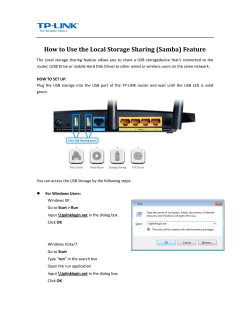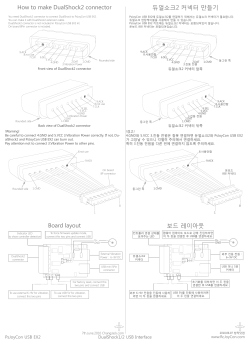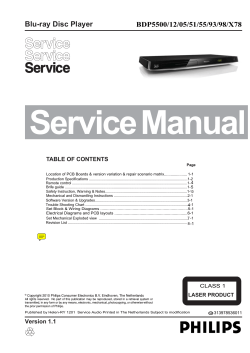
USB to SPI Bus Interface - Sample Project
Page 1 USB to SPI Bus Interface - Sample Project Overview This example project for the FT2232C demonstrates how to use the devices Multi-Protocol synchronous Serial Engine (MPSSE) to make a USB to SPI bus interface. The executable application and full project code (in Delphi) are provided. Requirements This project is designed to run on Windows 2000 or Windows XP and requires FTDI’s FT2232C drivers to be installed Test Circuit This project was developed and tested using the following circuit. 4 of the signal lines on channel A of the FT2232C were used. USB "B" Connector Ferrite Bead 470R VCC 1 27R 2 3 3 V C C 27R 4 5 6 10nF 33nF 8 7 V C C V C C I O A 3v3OUT V C C I O A USB DM USB DP 1.5K 5 14 31 42 0.1uF 46 A V C C SK (ADBUS0) Vcc 24 1 DO (ADBUS1) 23 2 DI (ADBUS2) 22 3 CS (ADBUS3) 21 4 CS VCC SK NC DIN NC 93LC56B DOUT FT2232C 8 7 6 GND 5 Vcc RSTOUT# 10K 43 XTIN 6MHz 44 XTOUT VCC 27pF 27pF 10K VCC + 0.1uF 0.1uF 10uF Decoupling Capacitors FT2232C-Proj01 USB to SPI Bus - Sample Project 4 RESET# 48 EECS 1 EESK 2 EEDATA 47 TEST A G N D 45 G N D G N D 9 G N D 18 25 G N D 34 © Future Technology Devices International Ltd. 2004 Page 2 Running the Sample Application Run SPITest.exe. The following dialogue window will be shown. Use the Device name drop down menu to select the MPSSE device that you want to talk to. Read - this will read the current contents of the 93LC56B. If the EEPROM is blank FF’s will be shown. Erase - this will erase the EEPROM contents. Prog To Addr - This will program the address value (in hex) to each address in the EEPROM. i.e. 0000 will be programmed to address 0000, 0001 to address 0001,...., and 007F to address 007F. Prog Frm File - This allows the EEPROM to be programmed with data from a file stored on the PC. The file used to program can be selected using Open from the File menu. The file path will be displayed under the File Name field. Clk Divisor - Allows the clock divisor for programming the EEPROM to be set. The full Delphi project files are available for this application program. Further Information FT2232C Device Datasheet AN2232C-01 - Command Processor For MPSSE and MCU Host Bus Emulation AN2232C-02 - Bit Mode Functions for the FT2232C FT2232C-Proj01 USB to SPI Bus - Sample Project © Future Technology Devices International Ltd. 2004 Page 3 Document Revision History FT2232C-Proj01 Version 1.0 – Initial document created April 2004. Version 1.1 – Document update July 2004. • Change references to 93LC46 to 93LC56. • Test circuit diagram corrected - CS(ADBUS3) changed to Pin 21. Disclaimer © Future Technology Devices International Limited , 2002 - 2004 Neither the whole nor any part of the information contained in, or the product described in this manual, may be adapted or reproduced in any material or electronic form without the prior written consent of the copyright holder. This product and its documentation are supplied on an as-is basis and no warranty as to their suitability for any particular purpose is either made or implied. Future Technology Devices International Ltd. will not accept any claim for damages howsoever arising as a result of use or failure of this product. Your statutory rights are not affected. This product or any variant of it is not intended for use in any medical appliance, device or system in which the failure of the product might reasonably be expected to result in personal injury. This document provides preliminary information that may be subject to change without notice. Contact Information Future Technology Devices International Limited 373 Scotland Street, Glasgow G5 8QB, United Kingdom. Tel : +44 ( 0 )141 429 2777 Fax : +44 ( 0 )141 429 2758 E-Mail ( Sales ) : sales1@ftdichip.com E-Mail ( Support ) : support1@ftdichip.com E-Mail ( General Enquiries ) : admin1@ftdichip.com Web Site URL : http://www.ftdichip.com Agents and Sales Representatives Please visit the Sales Network page of the FTDI Web site for the contact details our distributor(s) in your country. FT2232C-Proj01 USB to SPI Bus - Sample Project © Future Technology Devices International Ltd. 2004
© Copyright 2025





















